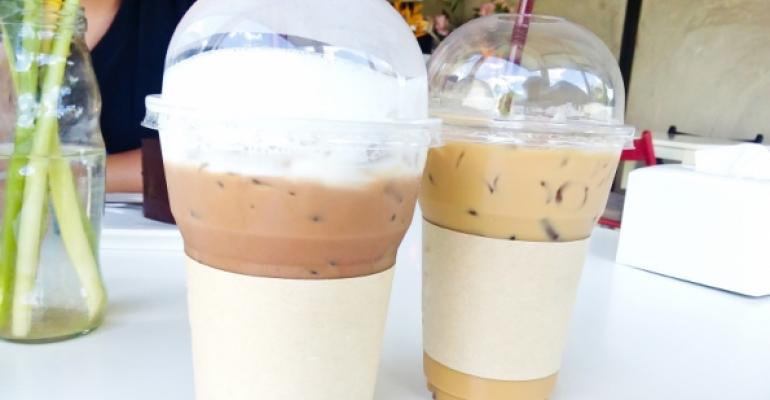The hunt for incremental revenues is leading restaurant operators to a dramatic business opportunity — the skyrocketing popularity of iced coffee as an all day, signature refreshment beverage
The preparation methods are varied, and include such techniques as hot coffee dripped over ice, cold-brew coffee steeped in cold water for long periods, creamy nitrogen-infused or “nitro” coffee on tap, and frappé-style coffees blended with ice.
Indeed, iced coffee is on a sharp growth trajectory. In foodservice, servings of iced coffee rose 17 percent in the year ending March 2016, according to CREST research by the NPD Group. Add to that the plethora of cold coffees in bottles, cans and cartons finding eager takers. Retail sales of cold brew coffee in the U.S. grew by 115 percent between 2014 and 2015, to $7.9 million, according to the research firm Mintel. Growth has been steady since 2010, increasing 339 percent through 2015, Mintel estimates.
Against this backdrop, some operators are promoting signature iced coffees along with beverages like artisanal sodas and flavored iced teas that satisfy the consumer craving for flavorful, cold refreshers.
For Wow Bao, a fast casual restaurant concept operated by Chicago-based Lettuce Entertain You Enterprises, three housemade beverages have been signatures since the first location opened in 2003. Featuring steamed Asian buns, Wow Bao now has five units in the Windy City and several licensed outlets in hotels, airports and colleges.
Wow Bao’s Thai Iced Coffee is made from freshly brewed, double strength coffee mixed with sweetened condensed milk and poured over ice. Homemade Ginger Ale, also offered in a pomegranate variant, is based on aromatic syrup that is cooked daily in the stores with 30-pound batches of fresh, peeled ginger. Fragrant Hibiscus Iced Tea is steeped in-store as well.
The hands-on beverage prep at Wow Bao is consistent with the chef-driven food philosophy of Lettuce Entertain You restaurants, explains Geoff Alexander, Wow Bao’s managing partner. “Chefs are doing more than just food today,” says Alexander. “They are focusing really hard on flavor in beverages, too.”
Developed long before the current cold coffee trend, Thai Iced Coffee is “sweet, potent and very refreshing,” Alexander says. “It is smooth and creamy, and the coffee flavor really comes through.”
“We definitely have guests who come in for our Thai Iced Coffee,” adds Alexander. “In some of our restaurants it’s their wake up coffee. And it is popular at the 3 o’clock hour, too.”
Cold Press and Crafted Press coffees are popular chilled offerings of Caribou Coffee, a Minneapolis-based chain of premium coffeehouses with more than 274 company-owned stores, 130 domestic licensed locations and 24 Coffee & Bagels stores in partnership with Einstein Bros. Bagels.
Cold Press is a cold brew made by steeping beans in cold water for 12 hours. “That makes it lighter on the palate, yet gives it tons of flavor as well,” says David Marshall, lead culinary chef for Caribou.
Caribou guests enjoy Cold Press over ice, straight up and blended into handcrafted, made-to-order Crafted Pressed coffees with additions such as cream, sugar and syrup. “We aerate it in the blender because that mixes it better and lightens it up,” says Marshall. He points out that the indulgent flavor of Crafted Press belies its modest calorie count. A 16-ounce Crafted Press contains 100 calories — 125 with a shot of Madagascar vanilla syrup.
“The Cold Press and Crafted Press are among our top sellers,” Marshall says. “They are selling just as well as our customizable super-indulgent drinks.”
The iced coffee of Eastman Egg Company — with two restaurants serving breakfast, lunch and coffee and a food truck in Chicago — represents the best of both worlds of cold java technique. A drip coffeemaker brews coffee directly over ice at a concentration level that dilutes it to a specified strength. Separately, the same bean is cold brewed for 24 hours. Ultimately, the two finished batches are combined.
The combo method results in a brew that tastes “a little more agile, a little more sprightly” on the palate than iced coffee made with either hot brew or cold brew alone, says Drew Davis, Eastman’s chief operating officer and executive chef.
“We found that we really love the balance between the body of cold brew and the acidity of hot brew over ice,” says Davis. “And people have been really receptive to it.”
Adding to its signature nature is the fact that the Eastman iced coffee is made with a rotating single origin coffee grown by farmers in locales such as El Salvador and Peru.
“Our approach is less technique driven,” Davis adds. “It’s not important to me that it’s cold brewed. It’s not important to me that it’s nitro infused or carbonated. It’s important to me that it tastes really good and it’s consistent.”





